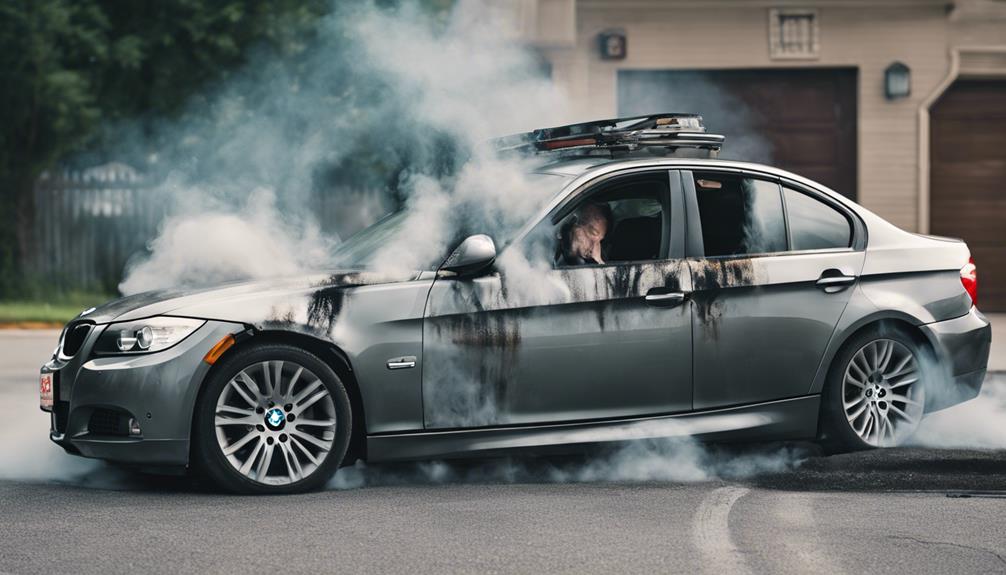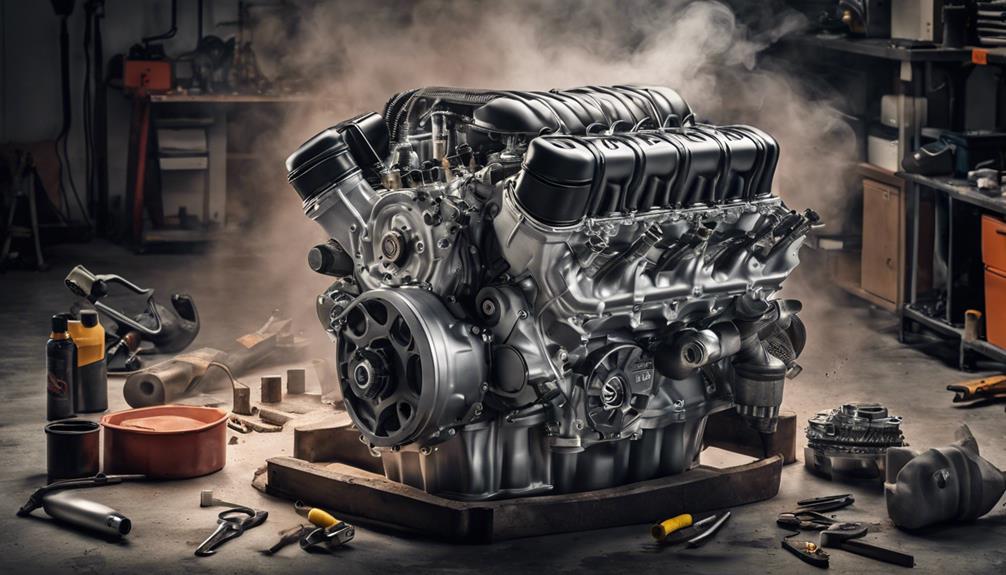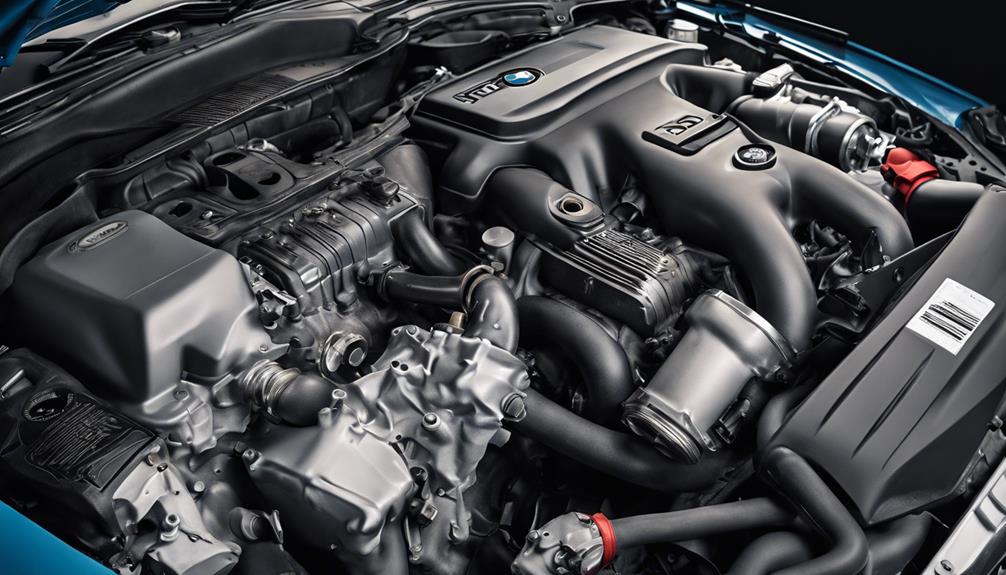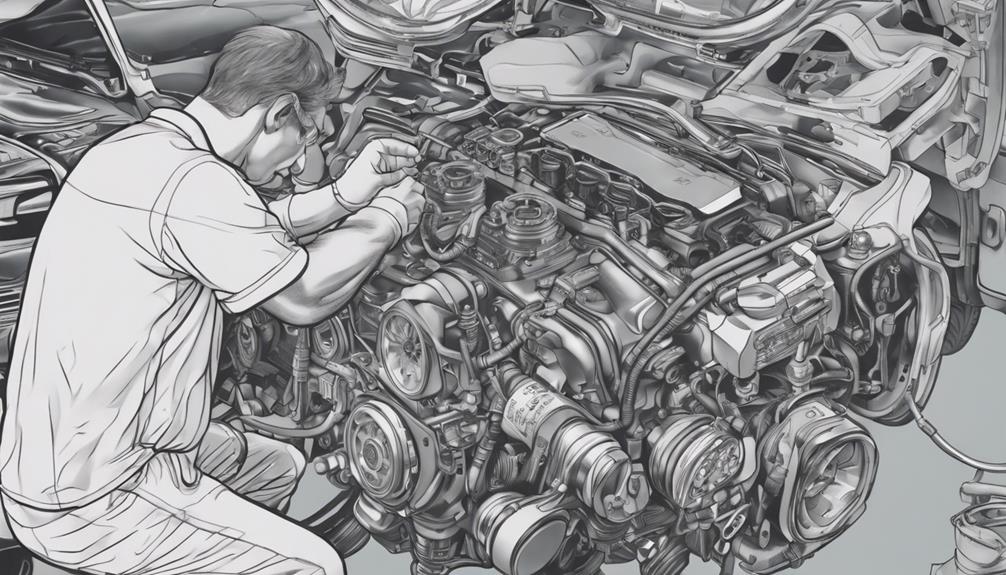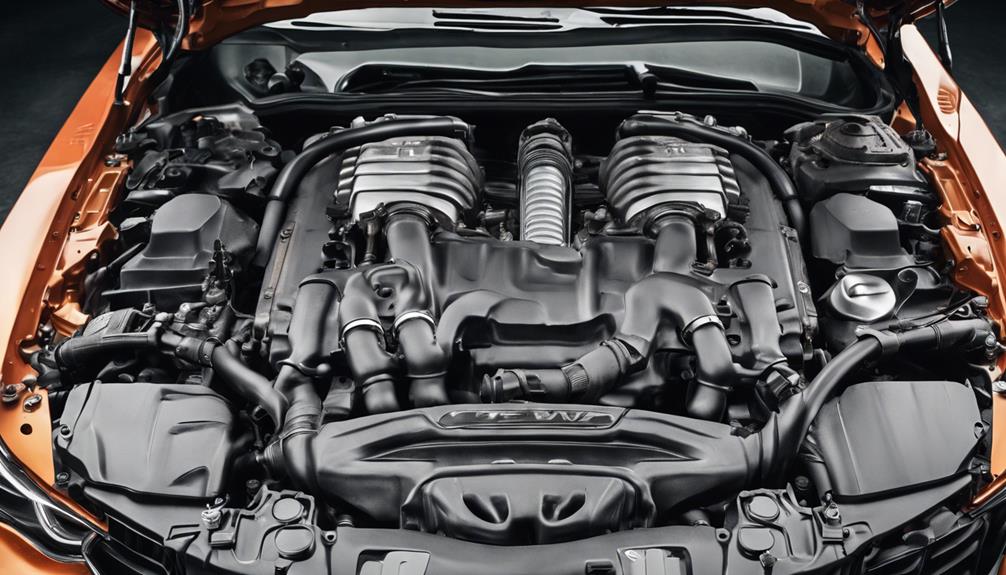Owning a BMW 335xi means keeping an eye out for key issues like engine overheating, turbo failure, electrical glitches, drivetrain troubles, and coolant system leaks to steer clear of costly fixes and guarantee peak performance. Vigilance is your ally in tackling these common pitfalls that could otherwise dampen your driving experience. Remember, a proactive approach to maintenance can go a long way in maintaining your prized BMW's peak condition.
Key Takeaways
- Engine overheating due to cooling system failures.
- Turbocharger issues leading to power loss.
- Electrical gremlins causing dashboard warnings.
- Drivetrain problems affecting performance.
- Cooling system leaks causing potential engine damage.
Engine Overheating Issues
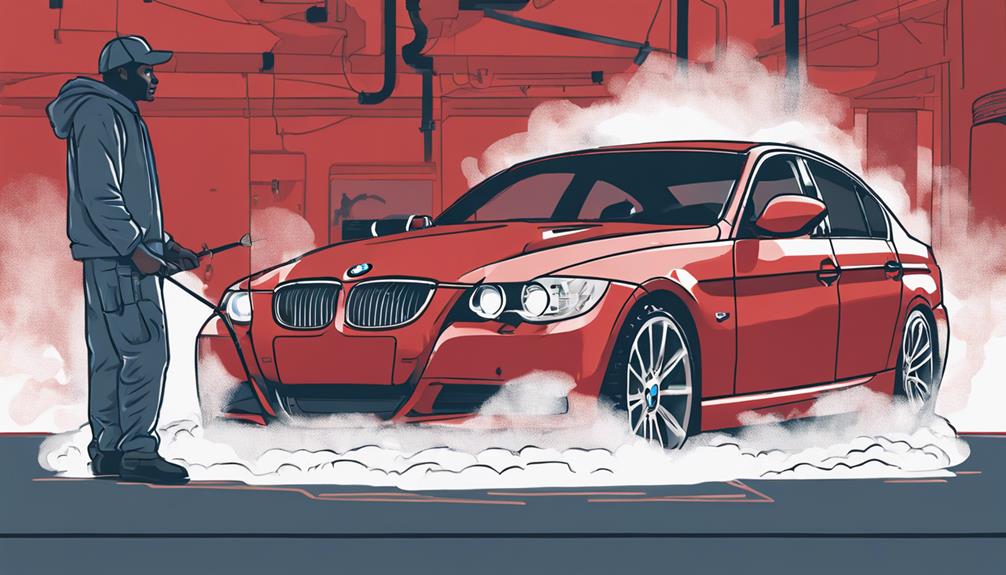
If you own a BMW 335xi, be vigilant about potential engine overheating issues to avoid costly repairs and prevent damage to your vehicle. Engine overheating is no joke; it can lead to some hefty bills and a whole lot of frustration.
Common culprits behind engine overheating in your BMW 335xi include cooling system failures, coolant leaks, and thermostat malfunctions.
Picture this: you're cruising down the road, the sun is shining, and suddenly, your dashboard lights up like a Christmas tree, steam billows from under the hood, and your engine temperature starts creeping up. That's the telltale sign of an overheating engine. Ignoring these warning signals might just land you with engine damage, warped cylinder heads, or even total engine failure.
To avoid such nightmares, stay on top of your regular maintenance, keep an eye out for any leaks, and address cooling system issues promptly. Remember, a cool engine is a happy engine!
Turbo Failure Concerns
If you own a BMW 335xi, you should be wary of turbo longevity issues, as these can be a significant concern, particularly in older models. Keep an eye out for warning signs like decreased power and engine performance to catch potential turbo failures early.
To prevent expensive repairs, make sure to follow maintenance tips to preserve your turbocharger's health and overall engine performance.
Turbo Longevity Issues
When owning a BMW 335xi, the longevity of the turbo is a vital concern, especially in early model years like 2007, 2008, and 2009. Here are some key points to keep in mind:
- Turbochargers in these models may face premature wear and potential failure, impacting engine performance.
- Turbo failure can lead to power loss, engine overheating, and expensive repairs.
- Regular maintenance and monitoring turbo health are essential to avoid unexpected failures.
Being proactive in caring for your turbo can save you from headaches down the road. Upgrading to stronger aftermarket turbos could be a wise investment to enhance both longevity and performance in your BMW 335xi.
Warning Signs to Monitor
Monitoring warning signs that indicate potential turbo failure in your BMW 335xi is crucial for maintaining peak performance and avoiding costly repairs.
Keep a keen eye out for symptoms like loud whistling noises, decreased acceleration, and engine misfires. These can signal underlying issues with your turbocharger.
Ignoring these red flags may lead to more severe consequences such as engine damage and increased fuel consumption. Being proactive and addressing warning signs promptly can save you from significant headaches down the road.
Stay vigilant, especially if you notice excessive smoke from the exhaust or a loss of power. Remember, early detection is key to preventing turbo failure and ensuring your BMW 335xi runs smoothly.
Maintenance Tips for Prevention
To prevent turbo failure concerns in your BMW 335xi, maintain regular maintenance of key components like the high-pressure fuel pump and wastegate. Here are three essential tips to keep your turbo running smoothly:
- Regularly check and replace the high-pressure fuel pump: Prevent power loss and engine issues by ensuring this component is in top condition.
- Conduct routine maintenance on the wastegate: Avoid rattling and loss of power over time by keeping this part well-maintained.
- Monitor coolant levels and cooling system performance: Prevent overheating and cabin temperature issues by staying on top of your car's cooling system.
Cooling System Malfunctions
If you're noticing unusually high temperatures inside your BMW 335xi, even with the A/C blasting, it could be a sign of cooling system malfunctions.
Keep an eye out for warning signs like coolant leaks or thermostat failure to catch potential issues early on.
Addressing these problems promptly is key to preventing engine overheating and costly repairs down the line.
Overheating Warning Signs
When your BMW 335xi exhibits overheating warning signs, prompt attention to potential cooling system malfunctions is essential to prevent costly damage. Here are some signs to watch out for:
- High Engine Temperatures: If you notice the temperature gauge rising above normal levels, it could indicate a cooling system issue.
- Dashboard Warning Lights: Keep an eye out for any warning lights related to the engine or coolant temperature.
- Coolant Leaks: Puddles of coolant under the car or visible leaks in the engine bay are clear indicators of a problem.
Taking action at the first signs of overheating can help you avoid more significant issues down the road.
Coolant Leaks Detection
Detecting coolant leaks in your BMW 335xi is essential for maintaining peak engine performance and preventing potential overheating issues. Coolant leaks are common culprits behind cooling system malfunctions in the 335xi, often stemming from issues like cracked coolant tanks or damaged hoses.
These leaks can lead to low coolant levels, risking engine overheating. Regularly inspecting your cooling system is key to catching and resolving coolant leaks early. Keep an eye out for any puddles of coolant under your car or a sweet smell in the engine bay, as these could indicate a leak.
Addressing coolant leaks promptly can help you avoid costly repairs and keep your BMW running smoothly.
Thermostat Failure Symptoms
Thermostat failure in a BMW 335xi can trigger engine overheating and potential damage, impacting both performance and efficiency. If you suspect thermostat issues, keep an eye out for these symptoms:
- Critical Temperature Gauge: Watch for erratic temperature readings that may signal a failing thermostat.
- Consistently High Reading: A consistently high temperature gauge without plausible explanation could point to thermostat malfunction.
- Reduced Engine Performance: A malfunctioning thermostat can lead to decreased engine efficiency, affecting your driving experience.
Being proactive about addressing thermostat problems in your BMW 335xi is essential to avoid costly repairs and further engine complications. Stay alert to coolant leaks, strange engine noises, or warning lights, as they could indicate thermostat issues within the cooling system.
Electrical Problems and Issues
Electrical gremlins lurking in your BMW 335xi can disrupt your driving experience, causing a cascade of issues from flickering lights to engine misfires. The BMW 335i model is known for its sleek design and powerful engine, but when electrical problems strike, it can put a damper on your joyride.
Issues with the battery, alternator, and sensors can manifest in dashboard warning lights that resemble a disco show, lights that can't decide whether to stay on or off, and electronics throwing tantrums. Faulty wiring, blown fuses, and corroded connectors are often the culprits behind these headaches.
These electrical woes can result in starting troubles, unexpected stalls, decreased fuel efficiency, and an overall drop in vehicle performance. Tackling these problems head-on is pivotal to prevent further damage and make certain you're not left stranded with a car that's more mood swing than smooth ride.
Common Complaints in Early Models

If you're eyeing an early model BMW 335xi, watch out for engine oil leaks and turbocharger wastegate rattle. These issues can lead to costly repairs and headaches down the road.
Opting for a newer model year might save you from these common complaints in the older versions.
Engine Oil Leaks
Experiencing engine oil leaks in early BMW 335xi models is a frustratingly common issue that owners often encounter. These leaks can stem from the valve cover gasket or oil filter housing gasket, causing potential engine performance issues and safety concerns.
To tackle this problem effectively, follow these steps:
- Regular Maintenance: Stay proactive with routine inspections to catch leaks early.
- Timely Repairs: Address leaks promptly to prevent further damage and costly repairs.
- Professional Assistance: Seek help from experienced mechanics for thorough diagnosis and precise solutions.
Turbocharger Wastegate Rattle
Amidst the performance concerns and engine disturbances in early BMW 335xi models, turbocharger wastegate rattle emerges as a prevalent nuisance impacting driving dynamics. The wastegate rattle, particularly notable in the 2008 model, can trigger engine rattling, illuminate the check engine light, and lead to a noticeable loss of power. Over time, this issue tends to exacerbate, affecting engine performance and potentially causing lasting damage. Owners may witness a decline in power output and overall driving experience due to wastegate rattle. Proper diagnosis and repair of the wastegate system are crucial to uphold optimal performance and reliability in the BMW 335xi.
| Turbocharger Wastegate Rattle |
|---|
| Common in early BMW 335xi models |
| Leads to engine rattling and power loss |
| Worsens over time |
| Impacts engine performance |
| Requires proper diagnosis and repair |
Recommended Model Years
When considering purchasing a BMW 335xi, focus on model years like 2010, 2012, 2015, and 2016 for enhanced reliability and performance. These specific years stand out for their improved engineering and fewer reported issues, making them prime choices for a worry-free driving experience.
Here's why you should target these model years:
- Enhanced Reliability: The 2010, 2012, 2015, and 2016 BMW 335xi models have earned a reputation for their reliability, with notably fewer complaints compared to other years.
- Improved Performance: These model years showcase refinements that not only enhance reliability but also boost overall performance, providing a thrilling driving experience without compromising on dependability.
- Resolved Design Inconsistencies: BMW addressed previous design flaws in these model years, ensuring that common issues like high-pressure fuel pump problems and wastegate rattle are less prevalent, giving you peace of mind on the road.
Opting for a BMW 335xi from 2010, 2012, 2015, or 2016 will likely offer a more satisfying ownership experience with fewer headaches along the way.
High-Pressure Fuel Pump Problems
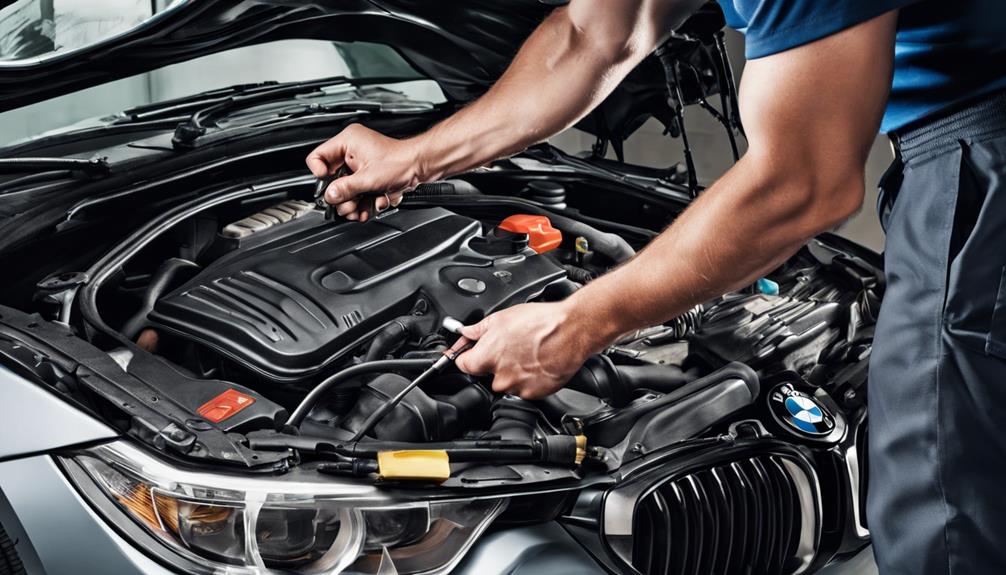
Considering a BMW 335xi? Be aware of the prevalent high-pressure fuel pump problems found particularly in the 2007 models. High-pressure fuel pump issues in the 2007 BMW 335xi can trigger the check engine light and result in power loss, causing frustration for drivers. BMW acknowledged these problems and even released a service bulletin to tackle the faulty high-pressure fuel pump concerns. The 2007 BMW 335xi units faced numerous complaints regarding high-pressure fuel pump failures, indicating a common flaw in this model year.
To avoid being caught off guard by high-pressure fuel pump troubles, staying on top of maintenance and addressing any warning signs promptly is essential. While these problems may be a nuisance, they can be managed effectively with timely repairs and preventative measures. Don't let high-pressure fuel pump issues put a damper on your BMW 335xi experience; stay informed and proactive to keep your ride running smoothly.
Wastegate Rattle Concerns
Experience the distinctive rattle of the wastegate in your BMW 335xi, a prevalent concern particularly notable in the 2008 model year. This rattling issue can be quite bothersome, indicating potential problems that need your attention. Here's what you need to know:
- Engine Rattling: The wastegate rattle can manifest as an unsettling noise coming from the engine compartment, signaling underlying issues that require immediate investigation.
- Power Loss: Ignoring wastegate problems may lead to a decrease in engine power, affecting your driving experience and overall performance of your BMW 335xi.
- Performance Decline: As wastegate concerns worsen over time, you may notice a decline in your car's overall performance, including slower acceleration and compromised efficiency.
To prevent these issues from escalating, it's essential to address wastegate rattling promptly. Regular maintenance and timely repairs can help keep your BMW 335xi running smoothly and efficiently, ensuring you enjoy a worry-free driving experience.
Top Reported Issues

If you've heard the unnerving rattle of the wastegate in your BMW 335xi, you may also encounter some other top reported issues worth noting.
Engine rattle and check engine light problems are prevalent in the 2008 BMW 335xi, potentially signaling more significant underlying issues.
Cooling system malfunctions leading to high cabin temperatures have been observed in select 2007 BMW 335xi units, causing discomfort for drivers and passengers alike.
Additionally, serpentine belt failures in the 2008 BMW 335xi can result in engine breakdowns and loss of power steering, posing safety hazards on the road.
Fuel system issues, such as faulty high-pressure fuel pumps in the 2007 BMW 335xi, can cause power loss and trigger the check engine light, affecting the vehicle's performance.
Moreover, some 2009 BMW 335xi models have been reported to experience noise and vibration problems due to low refrigerant levels in the A/C system, potentially impacting the overall driving experience.
Stay informed and proactive to address these top reported issues promptly.
Notable Model Year Problems
Opt for the 2010, 2012, 2015, or 2016 BMW 335xi model years for enhanced reliability and performance, steering clear of the common issues associated with earlier versions. When it comes to the BMW 335xi, selecting the right model year can make a significant difference in your driving experience. Here's why:
- Engine Performance: The 2010, 2012, 2015, and 2016 models boast improved engine performance with fewer reported issues, guaranteeing a smoother ride without the hassle of frequent repairs.
- Reliability: By opting for these specific model years, you're more likely to steer clear of common engine-related problems that plagued earlier versions, offering you peace of mind and a more dependable vehicle overall.
- Enhanced Driving Experience: With the engine being the heart of your BMW 335xi, choosing a model from 2010 onwards ensures a more exhilarating and trouble-free driving experience, letting you enjoy the road ahead without worrying about engine failures.
Choosing wisely can spare you from the headache of dealing with engine-related problems, making your BMW 335xi ownership experience a more enjoyable one.
Engine-Related Problems
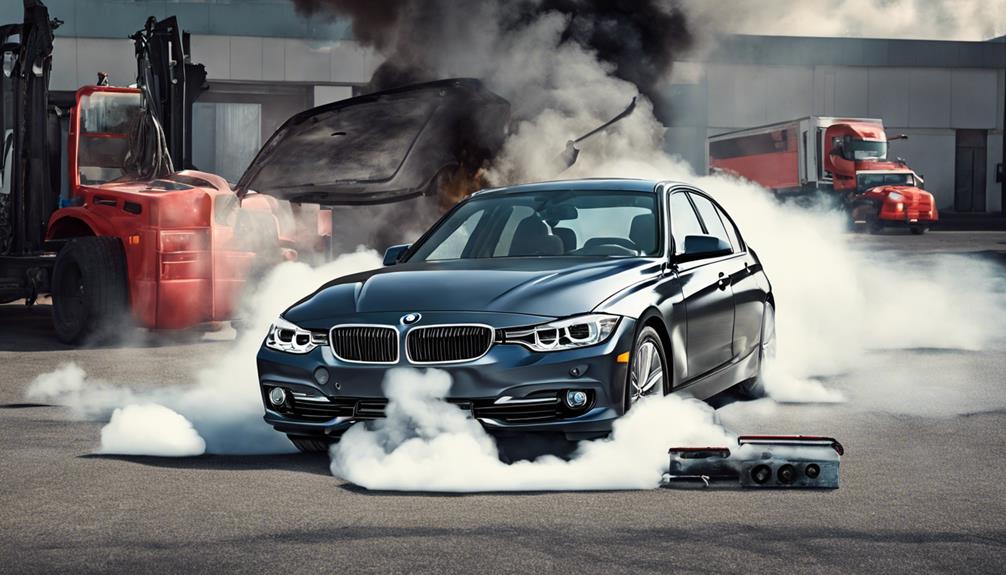
Common issues plague BMW 335xi owners, with engine-related problems such as overheating, turbo failure, rough idling, poor gas mileage, limp mode activation, and the challenging check engine light being frequent concerns.
Engine overheating can be a challenging issue in some BMW 335xi models, potentially leading to more severe complications if not addressed promptly. Turbo failure is another common headache, often resulting in decreased performance and efficiency.
If you notice your BMW 335xi experiencing rough idling or showing signs of poor gas mileage, these could be early indicators of underlying engine troubles that require attention. Limp mode activation, especially during overheating scenarios, is the engine's way of protecting itself but signifies a problem that needs fixing.
The check engine light, a universal symbol of automotive dread, often accompanies engine-related issues in BMW 335xi vehicles, serving as a persistent reminder to address the underlying problem promptly to avoid further complications.
Finding Solutions and Repairs
Wondering how to tackle the various engine-related problems in your BMW 335xi with efficiency and precision? Here are some solutions to help you address common issues like engine overheating:
- Monitor Cooling System: Regularly check your BMW 335xi's cooling system for any signs of wear or leaks. Keeping the cooling system in top condition can prevent engine overheating and potential damage.
- Address Turbo Failure Signs: Be vigilant for symptoms of turbo failure, such as decreased power or strange noises. Promptly addressing turbo issues can help maintain peak performance in your BMW 335xi.
- Professional Assistance: When dealing with sporadic electrical problems or more complex engine and drivetrain issues, seeking professional assistance is key. Professionals can offer expert diagnosis and repairs to make sure your BMW 335xi runs smoothly and reliably.
Frequently Asked Questions
How Long Do BMW 335xi Last?
You wonder, "How long do BMW 335xi last?" Well, with proper care, a BMW 335xi can endure well beyond 200,000 miles, and some even reach 300,000 miles. Timely maintenance and repairs play key roles in extending its lifespan.
Which Year 335i Is Most Reliable?
For the most reliable BMW 335i, consider 2010, 2012, 2015, and 2016 models. These years boast low complaint rates and are favored by consumers. They offer better performance and fewer engine issues compared to other 335i model years.
What Is the Difference Between 335i and 335xi?
When choosing between the BMW 335i and 335xi, consider this: the 335xi is equipped with all-wheel drive for added traction and stability, while the 335i is rear-wheel drive. Your choice impacts performance and handling preferences.
Is 2008 BMW 335i Twin Turbo Reliable?
You may find the 2008 BMW 335i Twin Turbo unreliable due to engine rattle, wastegate issues, serpentine belt failures, faulty fuel pumps, and cooling system problems. These issues can lead to power loss and engine breakdowns.





